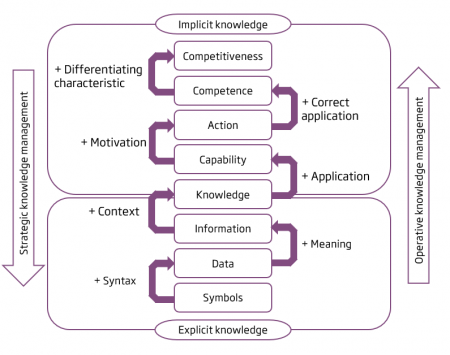
Hoy en día escuchamos a menudo, que somos capaces de hacer más de lo que creemos.
Football and competency assessment
Hoy en día escuchamos a menudo, que somos capaces de hacer más de lo que creemos.
Definition of Knowledge Management and its Components
What is knowledge? And how would you explain it in the simplest possible way?
Here, using the example of a cook and his activities in the kitchen, the concept of the knowledge scale according to Klaus North is presented.
 Definition of Knowledge and its components (Klaus North)
Definition of Knowledge and its components (Klaus North)
What does the term knowledge contain and what components does it consist of? Implicit and explicit knowledge, competence, capability, information and, finally, the concept of knowledge management and its possible practical application are presented in a familiar context.
🔦 Imagine a chef working in a restaurant who wants to offer a new section of vegetarian dishes on the menu.
The chef knows how to cook vegetables, but does not have much #knowledge on how to create tasty and well-balanced vegetarian dishes that appeal to diners.
To address this situation, the chef can apply knowledge management to gain the knowledge needed to create these dishes.
First, the chef can start by gathering #information on available plant-based ingredients and their nutritional properties.
Then, he/she can look for #data on diners’ preferences for vegetarian dishes and market demand in general.
Through this collection of information and data, the chef can acquire explicit #knowledge and better understand the context in which he/she is working.
After acquiring this knowledge, the chef can apply his #culinary skills and start experimenting with different ingredients and techniques to create tasty and well-balanced vegetarian dishes.
Eventually, he/she can share his/her knowledge with other chefs and staff members in the restaurant, which fosters collective knowledge management in the organisation.
Finally, by actively, consciously and systematically using the acquired knowledge, the chef can create successful vegetarian dishes and thus develop #competence on vegetarian cuisine, stand out with his dishes from the rest of the surrounding restaurants and gain over time a #competitive advantage for the restaurant.
Through operational and strategic knowledge management, the chef has acquired the necessary knowledge to create new dishes and improve the quality of the overall menu, which has led to the success of the business.
Competencias organizativas para la resiliencia organizativa sostenible
Estamos muy emocionados de que nuestro abstracto sobre el tema “Competencias organizativas: la esencia de la resiliencia emergente” haya sido aceptado para la participación en IFKAD 2023 “Managing knowledge for sustainaibility”.
El tema elaboramos en colaboración con Katrin Singer-Coudoux de Fraunhofer Institute for Production Systems and Design Technology IPK, Kristina Mirchuk y Oroitz Elgezabal de Geist Consultancy.
Según la teoría de la visión basada en los recursos (ressource based view – RBV), una organización puede considerarse como un conjunto de recursos físicos, recursos humanos y recursos organizativos (Barney, 1991; Amit y Shoemaker, 1993).
La teoría RBV sugiere que las diferencias en los recursos de la organización (tangibles o intangibles) se acumulan y aprenden a lo largo del tiempo, y la heterogeneidad de los recursos de la organización puede considerarse un conjunto de recursos físicos, humanos y organizativos. La heterogeneidad de esos recursos es la fuente de la ventaja competitiva (Srivastava, 2005).
Los recursos organizativos incluyen todos los activos, capacidades procesos organizativos, atributos de la empresa, información, conocimientos, etc., que posee una organización (Barney, 1991).
Estos pueden dividirse en activos (recursos de tener) y competencias (recursos de hacer) (Hall, 1991).
El objetivo de este trabajo es apoyar a las pequeñas y medianas empresas (PYME) mediante considerando el concepto de resiliencia organizativa como una propiedad asociada a las organizaciones, que surge de la interacción de determinadas competencias organizativas; identificando estas competencias y, definiendo la forma en que estas competencias deben interactuar, para que la organización sea considerada resiliente, según el marco definido por las normas ISO 22316 y BS 65000.
Este trabajo se inició en el marco del grupo de trabajo de la Sociedad para la Gestión del Conocimiento (Gesellschaft für Wissensmanagement e.V.) para apoyar la resiliencia de las PYMEs.
En 2022, en colaboración con Manfred Bornemann, pusimos el primer hito con la “Knowledge management as a booster for SME resilience in highly dynamic and disruptive operational contexts”.
Aquí puede encontrar un breve resumen de los resultados:
Operaciones empresariales en contextos turbulentos; KMGN Newsletter 2022.

